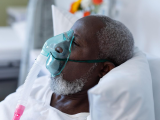Millions of Americans have been infected with COVID-19 since the pandemic of the novel coronavirus began in March 2020, and one of the most the most telling and troublesome symptoms of infection has been the loss of taste and smell.
A new study from researchers at Massachusetts Eye and Ear in Boston used surveys from patients diagnosed as having COVID-19 in 2021 to track the extent of smell and taste disturbance, and found that about a fourth of people—millions in total—who suffered from taste and smell changes did not recover fully.
The study is published in the journal The Laryngoscope.
The survey included responses from 29,696 adults who participated in the 2021 National Health Interview Survey (NHIS), a branch of the Centers for Disease Control and Prevention. In 2021, 35.8 million people, 14% of the adult US population, had been diagnosed as having COVID-19.
In total, 60.5% of surveyed participants infected with COVID-19 experienced a loss of smell and 58.2% experienced a loss of taste. Additionally, not all the patients experienced a full recovery of their senses once they recovered from their infection.
Roughly one-fourth report partial or no recovery
Following infection, 72.2% (95% confidence interval [CI], 69.9 to 74.3%), 24.1% (95% CI, 22.2 to 26.2%), and 3.7% (95% CI, 3.0 to 4.6%) of the patients experienced complete, partial, and no smell recovery, respectively.
Recovery rates for loss of tasted tracked similarly, with 76.8% (95% CI, 74.6 to 78.9%), 20.6% (95% CI, 18.7 to 22.7%), and 2.6% (95% CI, 1.9 to 3.4%) reporting complete, partial, and no recovery of taste, respectively.
Not only was overall COVID-19 symptomatology associated with smell and taste loss, but more severe symptom burden was also associated with a lower chance of sensory function recovery.
The authors extrapolated the findings to the entire US population and concluded that 20 million Americans lost their sense of taste or smell from COVID-19 in 2021 alone, according to a Massachusetts Eye and Ear news release. That would mean roughly 5 million had partial or no recovery.
Disease severity correlated with lingering loss of taste and smell, with the effect seen most strongly with taste disturbances.
"Not only was overall COVID-19 symptomatology associated with smell and taste loss, but more severe symptom burden was also associated with a lower chance of sensory function recovery," the authors wrote. "This finding bolsters support not only for vaccines but also other available treatments, such as Paxlovid, which likely decrease overall disease burden."
Loss of senses not benign
"With this data we can understand, in big numbers, how many people lost their sense of smell or taste due to COVID infection and how many people never fully recovered those senses," said senior study author Neil Bhattacharyya, MD, in the release.
And he said this finding is not as benign as people may think. Losing the sense of taste or smell can lead to weight loss, lack of enjoyment, and a general lowering of quality of life.
"When you hear about COVID-related smell loss, you think most people get it back and are fine. But there is a substantial number of people who don’t recover it," he said.



















